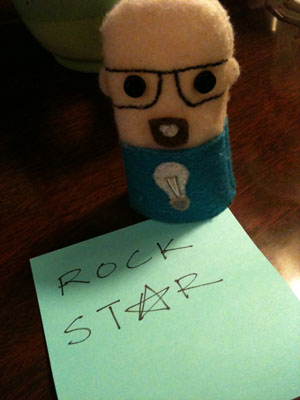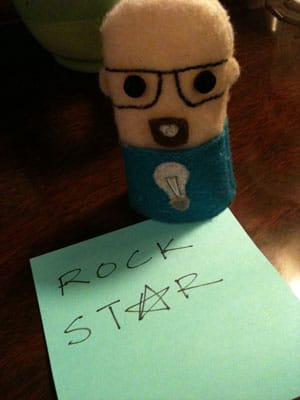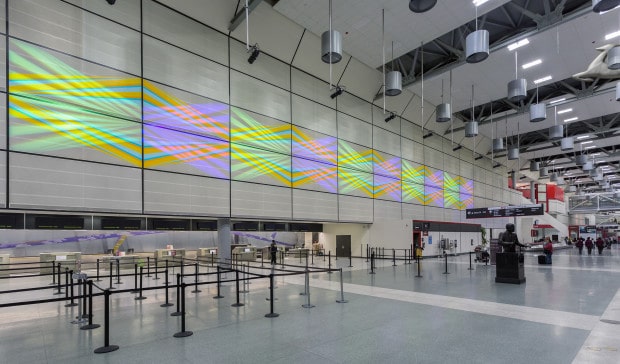
This is perhaps one of my favorite times of year.
This is a time where students and student designers (especially LIGHTING designers) are getting back into the swing of things in the University environment, and concepts are grabbing hold. Brains are being developed. The next generation of rockstar lighting people are being trained. This is all very exciting to me.
Something that I find relatively disturbing is the answer to the following question that I have asked many high school and college age people:
Who do you look up to in lighting? Who are your “rockstars?”
I have always been a nerd on the Nth degree – I looked up to people like Westinghouse and Edison, Niels Bohr and Robert Oppenheimer. Yeah, I am a nerd. Nerd is the new “passionate.” But when you look at the things that Michael Faraday, Georg Ohm, Alessandro Volta, Francis Robbins Upton, and people like them of their times accomplished and discovered, it’s hard to call people like Brittany Spears and Taylor Swift “rockstars.”
At least to me.
The people who are getting into light and lighting now are the people who are going to lead the technological development of it tomorrow. It’s so important to me that we not forget the work that the rockstars of today are doing (and STILL doing) to keep our industry progressing at a rapid, uncontrolled pace. When politics and money get in the way of technological process, it still, to this day, blows my mind. Our world LIGHT problems, like creating sustainable energy, figuring out how to better utilize incandescent light and arc sources, integrating dichroic glass into the world outside of entertainment, and the like are not problems solvable by policy and politics. These are technological issues. We need more technically interested people, and not policy makers to solve the issues. Jacques Fresco, a social designer and engineer, said that we don’t need more law, we need more technological solutions. If you’re driving down the road drunk, your car needs some sort of a system that feels the car oscillate and brings it to the side of the road to a stop – not a law that people constantly ignore, which causes death and destruction.
I found an article a while ago that sparked my feelings on this subject – Wired Magazine had an article about how the lack of nerds and geeks in our midst from the emerging young population is a national security risk. Whereas you all know how I feel about military uses of light, I tend to agree with this assessment of the shortage of people passionate about their future. Has the emerging population on average lost sight of the drive associated with work ethic? Is studying for a math exam less important nowadays than seeing what’s up on Facebook?
It certainly seems like it, doesn’t it.
I had the absolute pleasure over the Memorial Day weekend to meet a man named John Covington while I was hanging out with Rick Hutton from InLight Gobos over that weekend. John Covington is a guy who, along with Rick, was one of the initial ShowCo/Vari*Lite people from back in the 70’s and 80’s who developed a lot of the things we use in the lighting industry today, as well as, you know, the FIRST MOVING LIGHTS. John Covington works for PRG now – he’s the guru of all things analog.
I am in Nerd Heaven when I have those excellent conversations with Rick and John about things like lasers, laser ablation (which Rick was the first to do for gobos in our industry, which is why his gobos are so damned good), the first digital programmable ballast and power supply (which, by the way, JOHN was the first to invent, like two decades ago), and other amazing technological discussions. Hearing stories about the development of the VL1 and VL2 series, the VL5, laser gobo etching, and all that kind of stuff really, really makes me excited to be in this industry.
I look up to people all over the industries, because our industries are full of very rich and interesting history. You also learn a thing or two when you observe a master at work. Hell, I learned more about dance lighting design from Steve Shelley than I ever would have on my own. I also learned ridiculous amounts of things from Richard Cadena, who is just a smart fella full of excellent insight and information. I learned how to program a Hog from Benny Kirkham, who is one of the coolest cats I’ve ever met. The first programming book I ever read? A manual on lighting programming by Brad Schiller. I saw several Metallica shows as well – products of Brad Schiller’s creativity and prowess behind the desk. I learned from Richard Belliveau as well – I have spent more time inside of Intellabeams, Studio Spots, and Studio Colors studying the systems and figuring out what made them tick than I’d like to remember!
(Brad also helps me become more diverse when I write boring stories and post things that don’t necessarily interest the common good – thank you Brad!)
The list goes on and on. What is important is that each and every one of these people who I look up to as a lighting professional are out there doing what they do because they love it.
You have to have heroes – rockstars – people you look up to, people that you learn from, people that you value. When you realize that your career is more than just a job, I think that you are able to then figure out who really are your rockstars. Most of them are very humble, and have done what they have done in the industry because, well, it is their career. They don’t think they’re better than anyone, and they don’t have something to prove – they love their work. Dedication to furthering a career is something that no one can give you. You either have it or not. I highly encourage you to find out about the people who have done the developing of your particular industry and get to know them. You’re going to realize that you all have the same questions – and perhaps they have an answer or guidance that you would have never before realized.
If this is your industry, have respect – work hard at it. Become a nerd about it. It’s the only way to become the best. The people who are currently the best want you to be the best, too.
I want to say thank you to the industry, and all of the people associated with the industry who get it. Thank you for doing what you do, and being so damned great at it.





